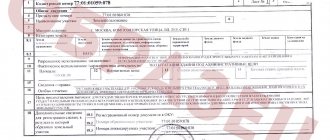Warning about eviction from residential premises
3
A sample notice of eviction from a residential premises, taking into account recent changes in legislation.
In accordance with Article 35 of the Housing Code of the Russian Federation, the owner of a residential premises is obliged to set a period for the voluntary eviction of a citizen from a residential premises, the right to use of which has been terminated. The law does not establish a specific form of warning in housing disputes.
The owner can give a warning about eviction either orally or in writing. However, at the court hearing, the plaintiff will be required to present evidence confirming that he set a deadline for the defendant’s voluntary eviction.
A written warning will be indisputable evidence of the establishment of such a period. The plaintiff must ensure that the written warning is received by the defendant.
This can be done by delivering the warning in person, against signature in your copy, or by sending it by mail with acknowledgment of delivery.
If the defendant avoids receiving a warning, you can invite two witnesses, with whom you can draw up an act stating that the defendant has been notified of the deadline for voluntary eviction from the premises and has received a written warning.
To: __________________________ (full full name of the defendant, address)
From: ____________________________ (plaintiff’s full name, address)
Receiving an eviction notice from a residential property is an unpleasant thing. But, as a rule, such a requirement is not news to the addressee.
What should the notice look like, who sends it and how does it deliver it, what should I do if such documents are served? We have answered these and other pressing questions below. But since each situation is individual, the site offers a free “lawyer consultation” service.
Home » Housing disputes » Notice, demand, warning about eviction from an apartment
Termination of the right to use residential premises is most often initiated by the owner of the premises. But the procedure for forced eviction is quite complicated; you will need to follow all the nuances, go through all the stages of eviction, including sending a warning to the tenant, then a demand, and finally, after a positive court decision, a notice of eviction.
By law, every citizen of the Russian Federation has the right to housing, but sometimes residents lose this right due to some circumstances. Sometimes a tenant can change these circumstances (in the case when he violated any rules of the hostel, but after a warning about eviction he stopped doing so), but often such a happy way out of the current situation is impossible and the tenant faces eviction.
- Long delays in payment of utility bills or rent for residential premises.
- Use of residential premises for purposes other than their intended purpose.
- Recognition of a property as unsuitable for habitation or in disrepair.
- Carrying out major repairs in the building in which the rented residential premises are located.
- Transfer of an apartment to another owner (in accordance with a purchase and sale agreement, gift, or the entry of a new apartment owner into an inheritance).
- Other legitimate reasons.
- personal data of the tenant;
- the grounds on which the owner owns the residential premises;
- on what basis the tenant used the property (lease agreement, etc.);
- expiration date of legal grounds for use of this apartment;
- conditions under which the owner of the residential premises agrees to allow its further use by the tenant;
- the date by which the owner offers the tenant to vacate the property;
- an indication that the owner reserves the right to take legal action if the tenant does not comply with the requirements;
- date and signature of the owner of the residential premises.
Any owner should keep in mind that it is impossible to simply evict a tenant from a residential premises without reason. You always need valid reasons for eviction, otherwise the court will not satisfy the plaintiff's demands.
Even from the names themselves it becomes clear that these are three different documents. Therefore, before you begin to compile any of them, you should understand what purpose each of them serves and what it represents from a legal point of view.
Warning
If a tenant behaves inappropriately or violates the terms of the lease agreement, the owner of the residential premises must warn the tenant that his behavior is unacceptable.
For example, if the tenant committed any technical violations (changed communications, moved a partition, etc.
), the owner of the apartment sends the tenant an initial pre-trial claim - a warning, where he invites the violator to eliminate everything at his own expense.
Usually, the owner of the residential premises gives a certain period of time to correct the violations committed by the tenant. And only if the tenant ignores the warning, the owner of the residential premises can proceed to the next stage of pre-trial resolution of the dispute - sending the tenant a demand for eviction.
For example, citizen Ivanov rented out his apartment to citizen Petrov. For the first six months, the tenant behaved calmly, but then the neighbors began to complain to the owner about the constant noise in the apartment, music was playing loudly at night, screams and the noise of a fight were constantly heard from the living room.
Ivanov sent his tenant a warning about the inadmissibility of such behavior and a demand to stop disturbing the peace of the neighbors. Otherwise, he reserved the right to forcibly evict the troubled tenant through the court.
We invite you to familiarize yourself with: Form for notice of termination of a lease agreement
Petrov heeded the warning and stopped gathering noisy groups in the apartment, thereby saving himself from the need to look for other housing, and his neighbors from the need to complain to the owner of the apartment. This was the end of the incident.
Requirement
But tenants do not always take into account the warning from the owner of the premises. Or another reason for eviction occurs, for example, the expiration of the rental agreement or the owner of the apartment decides to sell it. In this case, the owner of the residential premises informs the residents that they must leave the premises and gives them a certain period of time to find new housing.
For example, the owner of a two-room apartment rented it out, but a year later he urgently needed money and decided to sell the property. He sent a registered letter to the tenants demanding that they leave the premises within a month in connection with its sale.
The tenants were unable to find suitable housing within a month and turned to the owner with a request to postpone the eviction for another month. Since the buyer agreed to postpone the eviction of the residents, having entered into their difficult situation, the seller also did not object and allowed the residents to stay in the apartment for another month.
Notification
The notice is given to the tenant after the court decision has been made and it has entered into legal force. It must contain the reasons for the eviction and a reference to the court decision that has entered into force.
It is impossible to challenge the notice, as well as to extend the eviction period specified in the notice.
If the tenants ignore the notice, the owner of the residential premises may apply to the SSP for forced eviction.
The owner sent the tenant a demand to evict and set a deadline for vacating the house - within one month from the date of receipt of the document. Khovansky ignored the demand. Then Nikitin filed a lawsuit for eviction and won the legal dispute. After receiving the court's decision, he sent the defendant a notice to evict from the country house within five days.
Khovansky ignored this notice too. The plaintiff was forced to apply for the opening of enforcement proceedings to the SSP. The offender was forcibly evicted with the help of bailiffs and police.
Before embarking on a legal battle to evict unwanted tenants, the owner of the premises must try a pre-trial method of solving the problem, in other words, try to solve the problem peacefully. This will save both the apartment owner and his tenant from unnecessary moral and material costs.
Moreover, if peaceful options are not used, the court may not accept the claim for eviction.
The first way to resolve the problem outside of court is to issue an eviction notice. this document does not contain requirements to leave the residential premises immediately; rather, it is a requirement to eliminate violations.
It should contain the following information:
Sample notice of eviction from a residential premises
The next document indicating that the tenant’s further stay in the owner’s apartment is undesirable is a demand for eviction. The legislation does not determine the form of such a requirement, so it is drawn up in any form. The structure of the requirement is approximately the same as the warning; the document must contain the following information:
- to whom the eviction request is addressed;
- a message that you are the owner of the residential premises and the reasons for which you own the apartment;
- direct requirement to vacate living space;
- the period by which the tenant must move out of the occupied area;
- reason for eviction;
- intentions to file a claim for eviction in court in case of failure to comply with the requirement;
- date and signature.
Sample request to vacate residential premises
Another document that the owner must send to the negligent tenant, but only if the court decision comes into force, is a notice of eviction. To draw up a notification, you must fill out a standard form.
It must be remembered that sending such a document is mandatory; if the owner begins forced eviction without prior notice to the tenants, the latter can appeal the actions of the landlord in court.
Such a notice, unlike a warning or requirement, must be in writing, drawn up on A4 paper and filled out in strict accordance with the form.
We suggest you read: What to do if registration of ownership of an apartment, land or other real estate is refused
Statement of claim to the court for the removal of the former owners from the apartment
Use the address of the defendants to indicate the address of the apartment from which you want to remove the former owners. This is necessary for the court to send them subpoenas (Article 113 of the Code of Civil Procedure of the Russian Federation). According to the logic of the court, the residence address of the defendants is their registration address (clause 63 of the Resolution of the Plenum of the Supreme Court of the Russian Federation of June 23, 2015 N25). Even if they do not live at their registration address and do not receive the notice, the court will still consider the notice to have been delivered. Receiving notifications is the responsibility of citizens. The court, according to the law, took all notification measures, and if the former owners do not appear at the court hearing, the judge will consider the case without their participation (in absentia under Part 4 of Article 167 of the Code of Civil Procedure of the Russian Federation). In this case, the chances of their being discharged increase.
If the alienation agreement indicated that the former owners and members of their family had to leave the apartment after the transaction, then fill out the paragraph on the first page that indicates this. If there is no such clause in the contract, then delete the paragraph. Alienation is the transfer of property from one person into the ownership of another person during purchase and sale transactions, donations, etc. For example, if an apartment was purchased, then the alienation agreement is a purchase and sale agreement.
We recommend reading: What is the size of the Olympic scholarship?
Grounds and conditions
The Civil Code of the Russian Federation speaks about this, specifically Article 293. According to it, a citizen can be “asked to leave” if he:
- systematically violates the rights of those living in the neighborhood, creates a threat to their safety and living comfort;
- uses housing for non-residential purposes (for example, equipped an apartment as a hairdresser);
- lost the right to use the apartment as a result of the termination of family relations;
- lives in a house that is officially recognized as dilapidated or in disrepair;
- does not pay for provided utilities;
- there is a mortgage debt and the citizen does not seek to repay it;
- moved in illegally;
- arranged an illegal redevelopment.
Read more about the grounds for eviction of registered citizens who are not owners here.
What documentation is prepared at the beginning of the procedure?
Let's consider the procedure for eviction from an apartment by court decision. This question is very complex and takes a lot of time. To begin with, the initiator tries to “reach out” to the offender using letters.
All notifications must be sent by registered mail with notification and a list of attachments, handed over to the addressee personally against signature.
Warning
Warning about eviction from residential premises - sample
This is a document in which the owner makes it clear to the tenant that his lifestyle does not suit him, indicates unacceptable violations and necessarily stipulates a deadline for their elimination.
In principle, this can be done orally, but then in court you will have to prove that the owner gave the negligent guest a delay to correct the situation.
Requirement
Request for eviction from residential premises - sample
There are two types: notification and compulsory.
In the first case, for example, the owner decides to sell the apartment or simply notifies that the tenant’s registration is coming to an end, and he is not needed for a new term.
In this case, it is also necessary to provide a period so that the expelled guest can take care of resolving the housing issue.
A compulsory demand is issued when the owner, say, becomes aware of unacceptable violations and he sets a condition: eliminate the violations or get out of the apartment.
Sample notification
Notice of eviction from an apartment - sample
It contains an indication of the reason and regulatory document (for example, a court decision on eviction from an apartment), according to which the tenant is asked to vacate the premises within a specified period.
In this case, you will need to provide the following documents:
- general civil identity card;
- social tenancy agreement or title papers;
- state duty check (it is 300 rubles);
- extract from the house register;
- a copy of the financial and personal account;
- evidence that the demand to evict is legal.
While the case is being considered, two months will pass - this is Art. 154 Code of Civil Procedure of the Russian Federation. Another two will be taken by making a decision and filing a cassation complaint (Article 119 of the same code).
According to Art. 428 of the Code of Civil Procedure of the Russian Federation will take another month to issue a writ of execution. And another two months are allotted to the bailiffs for the process of expelling the offender with all his “belongings” (Federal Law No. 229-FZ).
The deadlines may increase - failure of the responding party to appear at the meeting, complaints, requests to postpone, etc. also play a role here.
So it turns out that not just a registered tenant who has no rights, but even the authorized owner of the apartment can be evicted if he does not comply with the requirements for using the apartment or creates a threat to other residents of the house.
And if this is exactly what you are facing, you need to contact a competent lawyer as quickly as possible, who will not allow an unfair decision, and in general will reduce the risk of eviction to the street to a minimum.
We invite you to familiarize yourself with: Sample land lease agreement
It starts with a statement of claim.
The document is submitted, in accordance with the Civil Procedure Code of the Russian Federation, at the location of the defendant.
Mandatory in the claim
- full name of the court;
- passport information of the evicted applicant;
- requirement to evict (specify legal norms);
- why do you think that the specified person no longer has the right to stay within the walls of the house;
- what pre-trial measures were taken and what results they produced;
- what papers do you use to support your claim?
Application for discharge from an apartment through the court
- copies of statements of claim and attachments thereto for all persons participating in the case;
- copies and original documents confirming ownership of residential premises (agreement, certificate of inheritance, etc.);
- an extract from the house register, a certificate of persons registered at the address;
- a document confirming that the defendant does not have the right to use the apartment (deprivation of parental rights, etc.);
- notification that the person is obliged to vacate the residential premises with a note of receipt;
- other evidence in the case;
- receipt of payment of state duty.
- draw up a statement of claim;
- prepare an evidence base;
- carry out competently the procedure for pre-trial conflict resolution. Send by registered mail with notification or personally hand over to the defendant a copy of the statement of claim with all attachments;
- pay the state fee;
- file a claim with the judicial authority at the place of residence of the defendant or the location of the apartment if the conflict has not been resolved in a pre-trial manner;
- after filing a claim in court, you must wait for the summons to set the time for the meeting and appear at the meeting;
- if the claim is satisfied, receive a decision to terminate the use of the residential premises that has entered into legal force;
- contribute to the execution of the court decision.
We recommend reading: Is it necessary to pay Land Tax to a Pensioner?
From council housing
This means the early termination of a social tenancy agreement, which is usually concluded on an indefinite basis.
This issue is regulated by Art. 83-84 Housing Code of the Russian Federation.
It is understood that the person being evicted is obliged, after the court decision on eviction from the residential premises has entered into force, to vacate the occupied premises together with his family and belongings at a set time and hand over the keys to the municipality.
Both the municipality, the State Housing Inspectorate and even private individuals can initiate eviction from municipal square meters.
As already mentioned, they can be evicted either with or without the provision of an alternative in the form of other housing - comfortable or not.
A comfortable option will be provided if, so to speak, it is not the person’s fault in the grand scheme of things that he is being asked to leave his native land - for example, a building goes to the state or a religious community if it is declared officially unfit for habitation.
In other cases, they usually provide a room in a dormitory.
Alternative housing is not provided if a person destroys an apartment (this also includes illegal redevelopment, and there must be a threat of collapse), endangers the life and health of other residents, violates their rights, or renders the apartment uninhabitable. This also happens in the event of deprivation of parental rights.
Find out whether you can be evicted from your only home in our article.
Papers after the trial
- the court's decision;
- performance list;
- inventory of property and eviction act;
- document on deregistration.
A judicial eviction usually takes three months. The first two are usually occupied by the preliminary hearing and consideration of the case. Then another month remains as a period for appeal. And only after this the decision comes into force.
The court decision specifically states that it is the legal basis for the defendant's discharge. The plaintiff with this document comes to the territorial department of the Federal Migration Service or the passport office and the defendant will be deregistered unilaterally. Eviction may occur without provision of alternative accommodation.
To implement the court decision, the final document on the case is sent to the FSSP. From there, subpoenas are sent to the participants in the case. It may very well be that the person being evicted does not want any trouble and will vacate the premises himself. If this does not happen, the bailiffs will be kicked out of their homes without ceremony. After this, the evicted person’s belongings are sent to the storage location and a decision is made to terminate the proceedings.
Read about the process of eviction from municipal housing, from hostels and tenants who do not pay rent in the materials on our website.
Discharge of a resident without his presence
There are several ways to discharge a tenant from an apartment without his presence:
- Registration at a new address;
- By proxy;
- By the tribunal's decision.
There may be different reasons why a person cannot appear at the migration service and be discharged.
- Moved to another city;
- Seriously ill;
- Declared missing or dead;
- Called up for military service;
- Sentenced to serve time in prison;
- Lost the right to use residential premises by court decision.
If the tenant is located outside the Russian Federation, he can contact the migration service by mail with an application for deregistration.
Reasons for expulsion from an apartment
Forced eviction from an apartment by the owner is possible in the following cases:
- termination of family relations (for example, divorce or the emergence of alimentary obligations in relation to members of the former family - so that in this context even a child can become an “ex” member of the family);
- non-payment of utilities;
- systematic complaints about illegal behavior (use of an apartment not as a residential premises, subletting without approval, violation of the rights of those living in the neighborhood);
- expiration of the registration period or its early termination by court decision.
You just need to understand this term correctly - eviction of tenants by the owner.
As already mentioned, only the court has such a right, which means that the owner of the apartment can sue the negligent guests in court and win, and then the bailiffs will complete the matter.
If the tenants are, as they say, wrong all around - for example, they don’t pay for their accommodation, then the owner has no right to turn them out - in this case he has every chance of becoming the accused.
And if it also turns out that in his anger he somehow harmed an unwanted tenant, then everything is even worse - the violent owner may be charged under a criminal article, specifically, arbitrariness (Article 330 of the Criminal Code of the Russian Federation).
Possible reasons for eviction
Eviction of a person is carried out in the following cases:
- Termination of family relationships (divorce). If for some reason the marriage breaks up and one of the spouses wants to write out the other, in accordance with Article 31 of the Housing Code of the Russian Federation. If the owner of the apartment acquired it before marriage, then the housing is recognized as property that was not jointly acquired, and the court takes the owner’s side, after which the former relatives can be discharged without any problems.
- A citizen does not live at his place of registration for a long time and does not pay for utilities. He can be discharged by court - provided that he owns another home. Based on the received court decision, the person will be deregistered.
- Deprivation of parental rights. If further residence with children is prohibited by the court, bailiffs can evict the parents without providing them with other housing. In this case, the plaintiff is the guardianship authorities, and the law will be entirely on the side of the minors. People deprived of parental rights are automatically discharged.
- If the municipality that rents out the apartment intends to privatize it, it may decide not to include the tenants who live there in the number of participants in the privatization. Then you will have to be deregistered. In this case, the extract can be made both voluntarily and judicially.
- When taking ownership rights under a gift agreement or by inheritance, the new owner can expel the people registered there from the apartment through the court.
- When illegal refurbishment or redevelopment has been carried out in a residential premises, or a non-privatized apartment is used for other purposes. To do this, you will need to prove that interference with the structure of a residential building is dangerous for its other residents. It is necessary to file an application with the court to seize the home from the owner; the plaintiffs can be representatives of the HOA, members of the management company, and neighbors. If the court rules in favor of the plaintiff, the apartment will be sold at auction.
You may be interested in an article on how to privatize an apartment yourself; you can read about it here.







